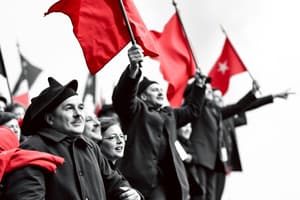Podcast
Questions and Answers
Which event marked the collapse of the Russian Empire during the Russian Revolution?
Which event marked the collapse of the Russian Empire during the Russian Revolution?
- October Revolution
- The rise of the Provisional Government
- The Reign of Terror in Russia
- February Revolution (correct)
What was a key motivation behind the French Revolution?
What was a key motivation behind the French Revolution?
- Desire for individual liberties and end to the monarchy (correct)
- Desire for a strong aristocracy
- Desire to expand the French Empire
- Desire to increase the power of the clergy
Who seized power in the October Revolution during the Russian Revolution?
Who seized power in the October Revolution during the Russian Revolution?
- Bolsheviks (correct)
- White Army
- Provisional Government
- Mensheviks
Which leader rose to power during Nazi Germany?
Which leader rose to power during Nazi Germany?
Which event in the French Revolution highlighted the power of the people against the aristocracy?
Which event in the French Revolution highlighted the power of the people against the aristocracy?
What inspired the Russian Revolution?
What inspired the Russian Revolution?
What policy of expansion based on racial purity was implemented by Nazi Germany?
What policy of expansion based on racial purity was implemented by Nazi Germany?
Which event began World War II?
Which event began World War II?
What key factors led to Hitler's rise to power in Germany?
What key factors led to Hitler's rise to power in Germany?
What event is associated with the rise of Joseph Stalin in the Soviet Union?
What event is associated with the rise of Joseph Stalin in the Soviet Union?
Which ideology was used by the Soviet Union under Stalin's rule?
Which ideology was used by the Soviet Union under Stalin's rule?
What did the Nazi Party use to capture political control in Germany?
What did the Nazi Party use to capture political control in Germany?
Flashcards are hidden until you start studying
Study Notes
Shaping Modern History: Four Pivotal Events
Throughout the 18th and 20th centuries, several seismic shifts in society and government transformed the international landscape, shaping the world as we know it today. Let's explore four key moments where historical events dramatically altered the course of history: the French Revolution, the Russian Revolution, Nazi Germany, and the rise of Adolf Hitler.
The French Revolution (1789 - 1799)
Propelled by a desire for individual liberties and an end to the monarchy, the French Revolution was a period of radical social and political upheaval. Key events such as the storming of the Bastille (1789), the death of King Louis XVI (1793), and the Reign of Terror (1793-1794) brought to light the power of the people against the aristocracy. The French Revolution served as a beacon of hope for oppressed peoples worldwide, inspiring later movements, including the Russian Revolution.
The Russian Revolution (1917)
Inspired by the example of the French Revolution and influenced by the turmoil of World War I, the Russian Revolution resulted in the collapse of the Russian Empire and the establishment of the Soviet Union. The February Revolution, led by the Provisional Government, paved the way for the Bolsheviks to seize power in the October Revolution, also known as the Bolshevik Revolution. The ensuing civil war (1917-1923) and the rise of Joseph Stalin saw the Soviet Union evolve into a totalitarian state that would later inspire various ideologies and dictatorships.
Nazi Germany (1933 - 1945)
The rise of Adolf Hitler and the Nazi Party in Germany is one of the most infamous episodes in modern history. The Nazi Party used propaganda, fear, and violence to capture political control and implement a policy of expansion based on racial purity, known as Lebensraum. The end result was the genocide of millions of Jews, Roma, and other victims in the Holocaust. World War II, which began with Germany's invasion of Poland in 1939, grew to encompass all of Europe, with its devastating consequences still felt today.
The Rise of Adolf Hitler
Adolf Hitler, born in Austria in 1889, rose to power in Germany through the Nazi Party. Hitler's cunning manipulation of public opinion, his fiery speeches, and the Party's use of the swastika symbol and its militaristic ideology led to the Nazi Party's meteoric rise. The global financial crisis of the 1920s and Germany's defeat in World War I made Hitler's message of national pride, social order, and economic prosperity particularly appealing to disillusioned Germans.
These four pivotal moments in history demonstrate how the interplay of social, political, and economic factors can lead to dramatic change. From the French Revolution to the rise of Adolf Hitler, the actions of individuals and groups have had profound effects on the world we live in today.
As we reflect on the legacy of these events, it is essential to recognize the power of ordinary people to shape their destiny, the consequences of the choices we make, and the importance of safeguarding human rights and democratic institutions. By understanding history, we can better prepare ourselves for the challenges of the future.
Studying That Suits You
Use AI to generate personalized quizzes and flashcards to suit your learning preferences.




